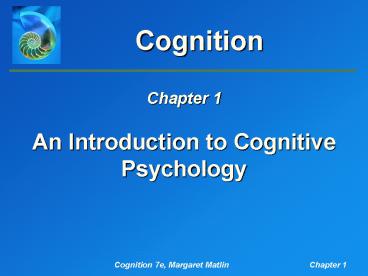An Introduction to Cognitive Psychology - PowerPoint PPT Presentation
1 / 17
Title:
An Introduction to Cognitive Psychology
Description:
An Introduction to Cognitive Psychology Cognition 7e, Margaret Matlin Chapter 1 Introduction Important Terms cognition cognitive psychology cognitive approach Study ... – PowerPoint PPT presentation
Number of Views:4918
Avg rating:3.0/5.0
Title: An Introduction to Cognitive Psychology
1
An Introduction to Cognitive Psychology
- Chapter 1
2
Introduction
- Important Terms
- cognition
- cognitive psychology
- cognitive approach
- Study of mental processes -- memory, perception,
language, learning, problem solving,
3
Introduction
- Why learn about cognition?
- Cognition occupies a major portion of human
psychology - Cognitive psychology will help you appreciate
many other areas of psychology, as well as
disciplines outside psychology - Cognitive psychology provides an "owner's manual"
for your mind
4
A Brief History of Cognitive Psychology
- The Origins of Cognitive Psychology
- Aristotle
- empirical evidence
- Wilhelm Wundt
- Introspection objective reports of experiences
- Early Memory Researchers
- Ebbinghaus memory abilities
- Mary Whiton Calkins - recency effect
- first woman president of APA
5
A Brief History of Cognitive Psychology
- The Origins of Cognitive Psychology
- William James
- Principles of Psychology - function
- tip-of-the-tongue phenomenon
- Behaviorism
- behaviorist approach objective, observable
- Watson
- Skinner
- operational definition
6
A Brief History of Cognitive Psychology
- The Origins of Cognitive Psychology
- The Gestalt Approach
- Gestalt psychology - organization
- Frederic C. Bartlett
- memory as active, constructive process
7
A Brief History of Cognitive Psychology
- The Emergence of Modern Cognitive Psychology
- 1956 the MIT symposium
- Ulric Neisser's Cognitive Psychology
- Factors Contributing to the Rise of Cognitive
Psychology - Disappointment with Behaviorism
- Linguistics Noam Chomsky
- Memory research
- Developmental psychology Jean Piaget
- object permanence
8
A Brief History of Cognitive Psychology
- The Emergence of Modern Cognitive Psychology
- The Information-Processing Approach
- a mental process can be compared with the
operations of a computer - a mental process can be interpreted as
information progressing through the system in a
series of stages, one step at a time
9
A Brief History of Cognitive Psychology
- The Emergence of Modern Cognitive Psychology
- The Information-Processing Approach
- Atkinson-Shiffrin model
- Sensory Memory
- Short-term Memory (Working Memory)
- Long-term Memory
10
Atkinson-Shiffrin Model
11
Current Issues in Cognitive Psychology
- ecological validity
- Cognitive Neuroscience
- social cognitive neuroscience
- Brain Lesions
- Positron Emission Tomography (PET scan) several
seconds - Functional Magnetic Resonance Imaging (fMRI) 1
second - Event-Related Potential Technique (ERP)
fraction of a second - Single-Cell Recording Technique
12
Current Issues in Cognitive Psychology
- Artificial Intelligence
- The Computer Metaphor
- structures and processes
- Pure AI
- Efficiency, maybe different
- Computer Simulation/Computer Modeling
- take human limitations into account
13
Current Issues in Cognitive Psychology
- Artificial Intelligence
- The Parallel Distributed Processing Approach
- parallel distributed processing (PDP) - -
connectionism - cerebral cortex - - neural networks
- serial processing
- parallel processing
14
Current Issues in Cognitive Psychology
- Cognitive Science
- Interdisciplinarycognitive psychology,
neuroscience, and artificial intelligence PLUS
philosophy, linguistics, anthropology, sociology,
and economics - Focus on internal representations
15
An Overview of Your Textbook
- Preview of the Chapters
- Five Themes in the Book
- Theme 1 Cognitive processes are active, rather
than passive. - Theme 2 Cognitive processes are remarkably
efficient and accurate.
16
An Overview of Your Textbook
- Five Themes in the Book
- Theme 3 Cognitive processes handle positive
information better than negative information. - Theme 4 Cognitive processes are interrelated
with one another they do not operate in
isolation. - Theme 5 Many cognitive processes rely on both
bottom-up and top-down processing.
17
An Overview of Your Textbook
How to Use Your Book
- Chapter Outline
- Chapter Preview
- Opening Paragraph
- Demonstrations
- Individual Differences Feature
- Applications
- New Terms and List at End of Chapter
- In-Depth Feature
- Section Summaries
- End-of-Chapter Review
- Recommended Readings
- Glossary































